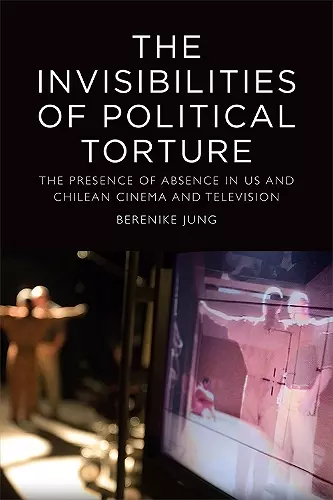The Invisibilities of Political Torture
The Presence of Absence in US and Chilean Cinema and Television
Format:Paperback
Publisher:Edinburgh University Press
Published:30th May '22
Currently unavailable, and unfortunately no date known when it will be back

Examines the ways in which moving images can help us better understand factual political torture Examines role of images and film in (mis)understanding of tortureOffers synergised knowledge through comparative angle, exploring differences and continuities of torture cases which were documented to vastly different extentsIncludes key popular movies, independent films as well as serial televisionCombines serious film analysis with ethical-political questions and historically and theoretically informed researchExpands on the latest developments of comparative media scholarship, and integrates the nostalgic, material and affective "turn." Academic work on the subject of torture tends to mirror public debates on its presumed utility, to focus on its historically ‘correct’ representation or on profilmic structures of identification. This book moves beyond these ideologically charged questions to explore how contemporary films have responded to a growing popular distrust in visual evidence when referencing factual cases of torture. Two cases studies – the United States around 2004 and Chile from 1973 until the end of the dictatorship – provide either an abundance or lack of such visual evidence. Drawing on films and television series such as Zero Dark Thirty (2012), NO (2012), Homeland (2011–) and Los 80 (2008–14), amongst many others, this book analyses the visible components of torture but also its invisibilities. By casting a wider net on the definition of torture, the author promotes a radical, theoretical reframing of our concept of torture and suggests that audiovisual products can help broaden our comprehension of torture as an event which includes collective and emotional dimensions and long-term social effects.
This excellent book grabs and holds the reader from the very first sentence. Jung’s extremely clear and compelling argument offers illuminating insight into the Twenty-first Century’s audio-visual obsessions with torture. With exemplary analysis of some of the key films and television shows of recent years, The Invisibilities of Political Torture speaks directly to a world where the rights expected of democracy seem once again to teeter uncertainly. Whether we learn the lessons of World War Two, the Cold War and the war on terror, or whether the reach of state terror expands once again, how we comprehend the role of torture in our society through film and television will be integral to our future. -- David Martin-Jones, author of Cinema Against Doublethink (2018)
This strikingly original, engagingly written work adopts an illuminating transnational approach to explore representations of torture across a wide range of US and Chilean film and television sources. It combines, seamlessly, close textual analysis with historical contexts, viewed through the lens of contemporary political, philosophical and cultural theories. It provides urgent, eloquent arguments for understanding and compassion. -- John King. Author of Magical Reels: A History of Cinema in Latin America
ISBN: 9781474437004
Dimensions: unknown
Weight: unknown
224 pages